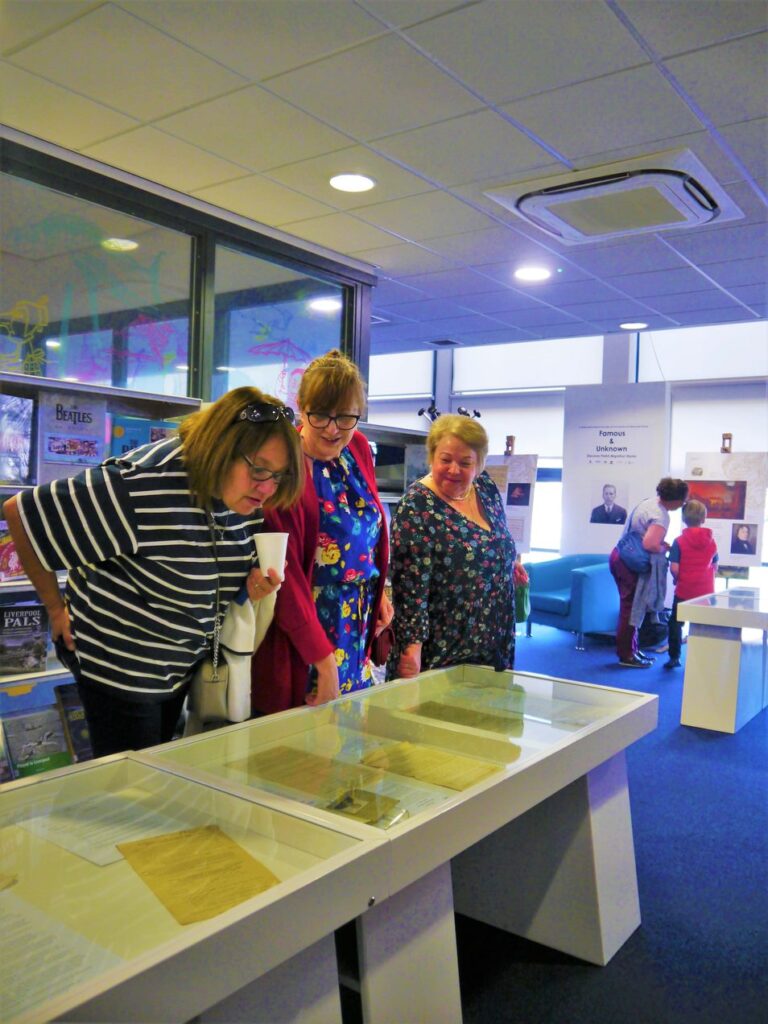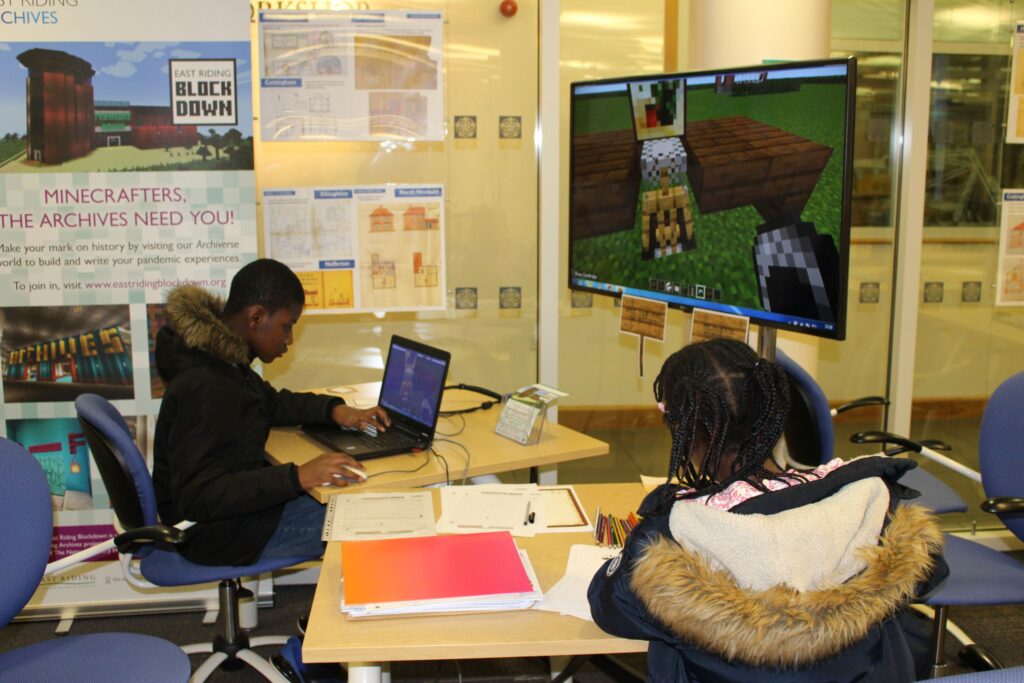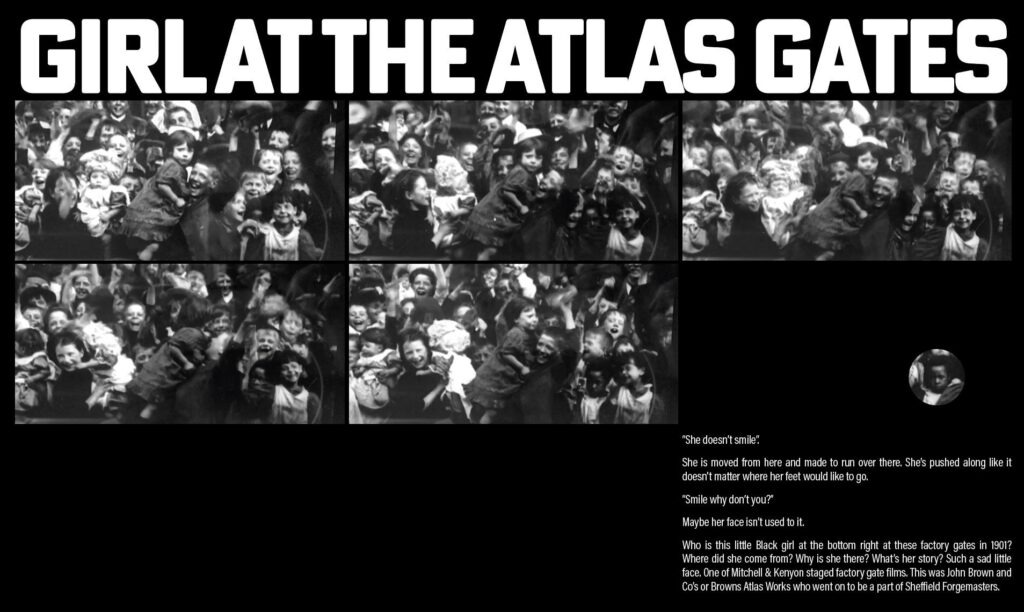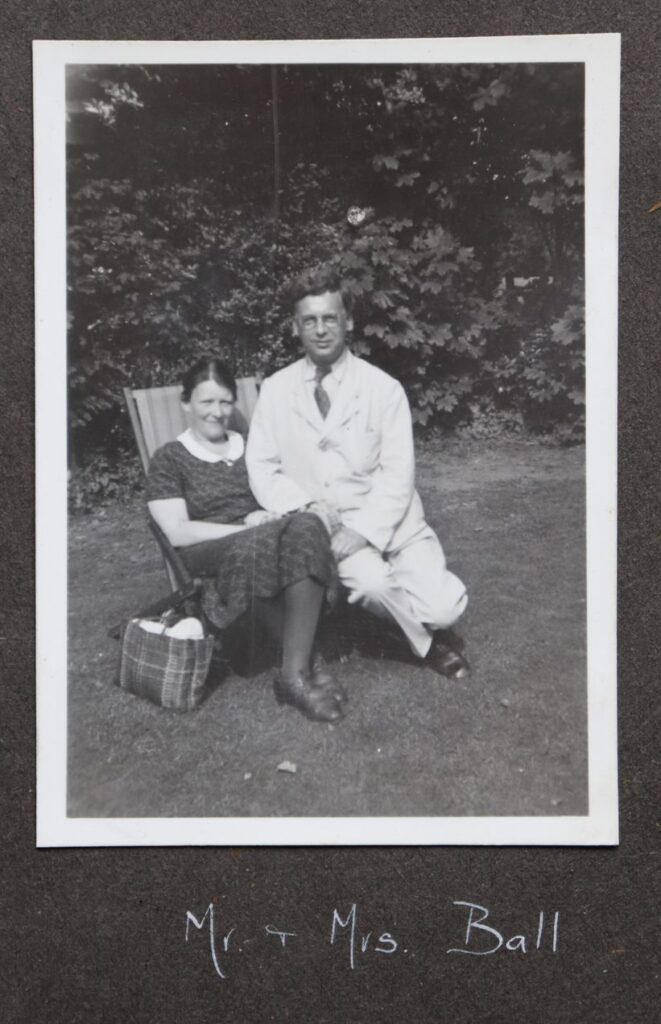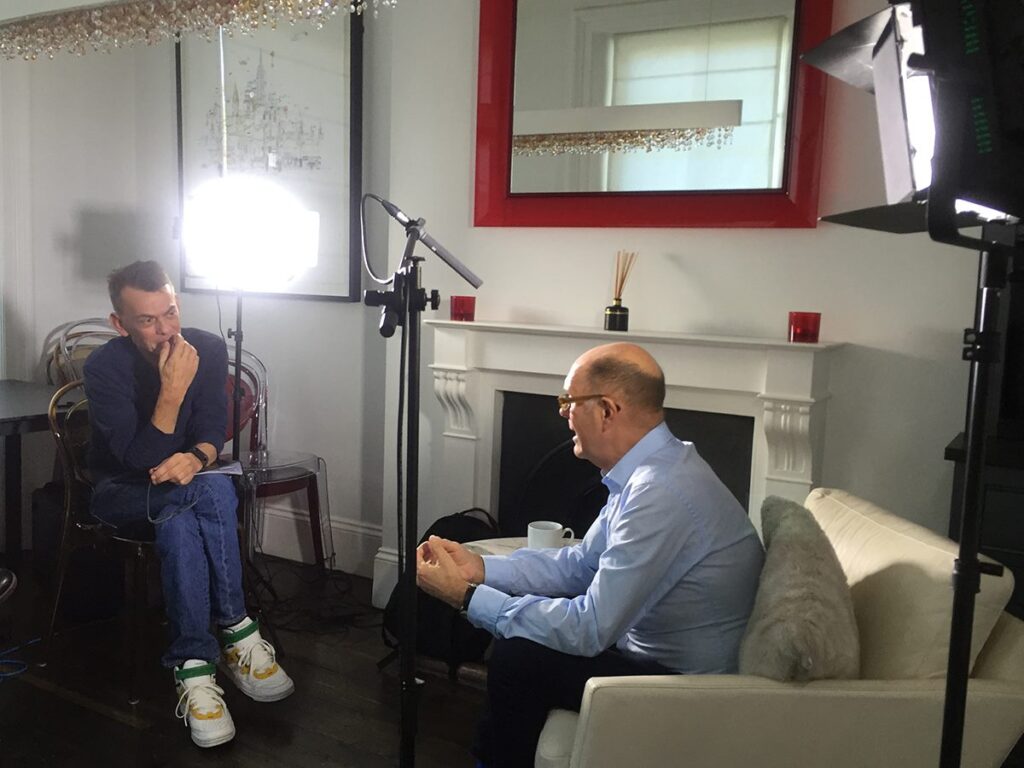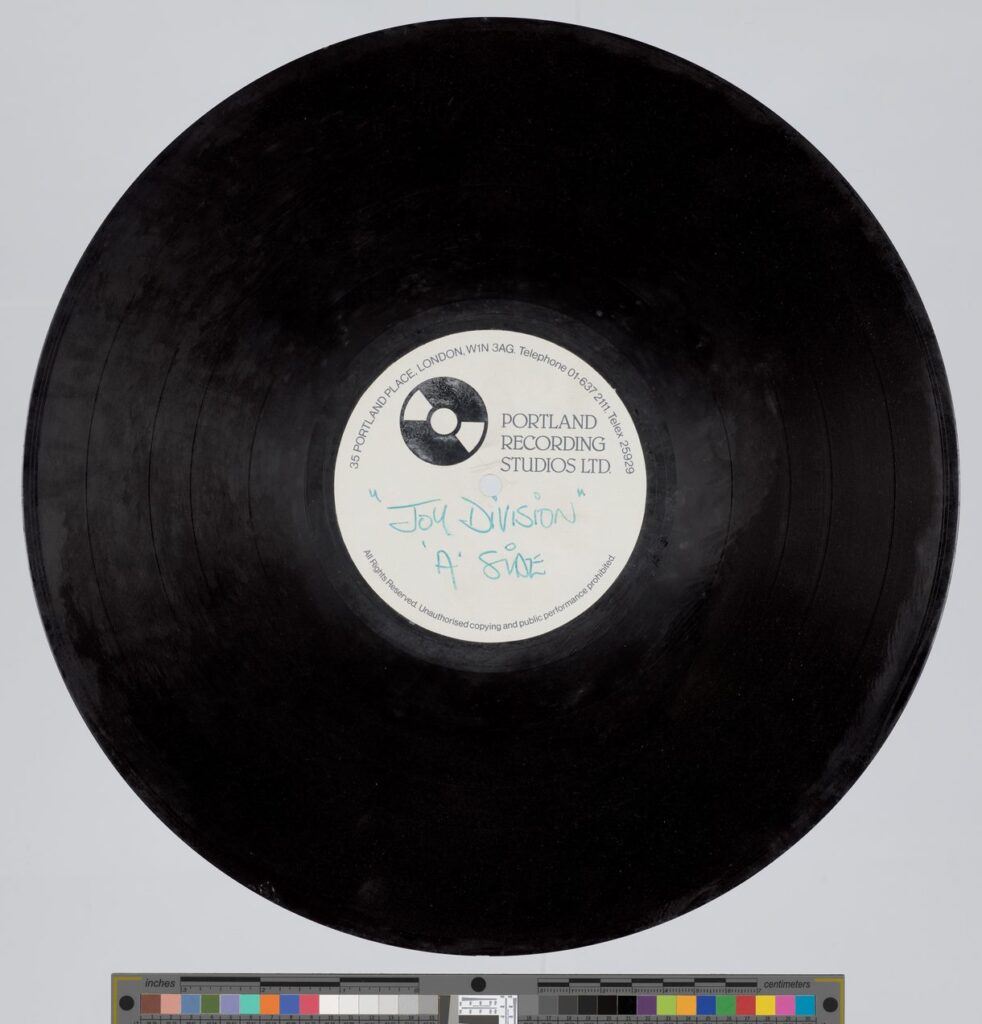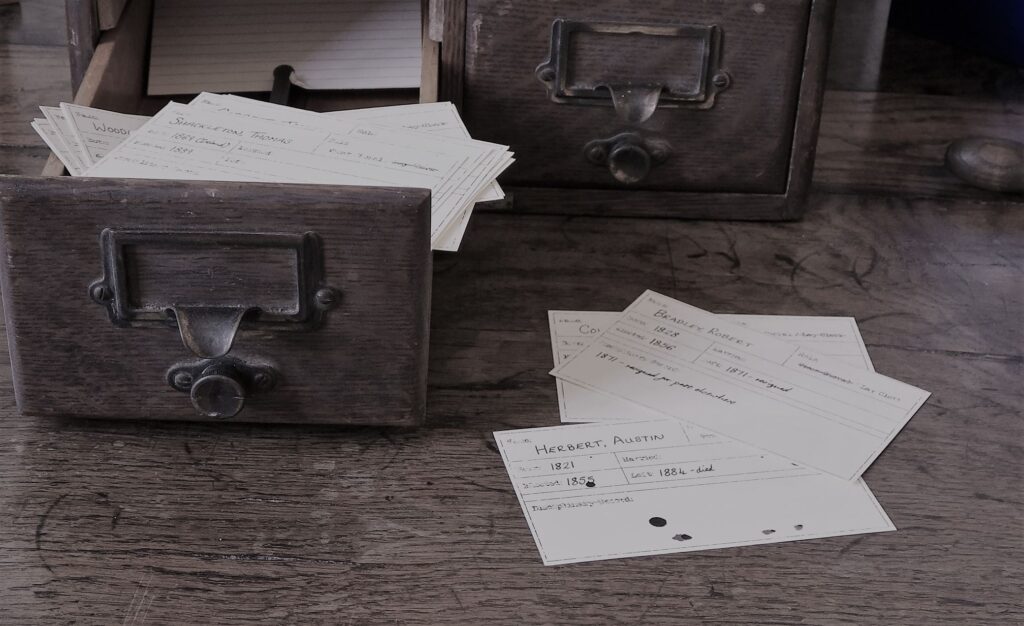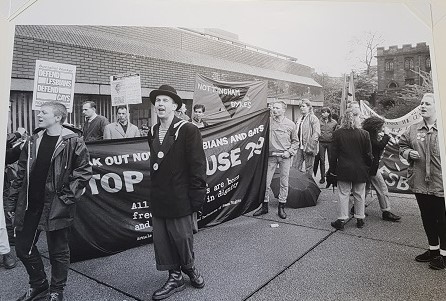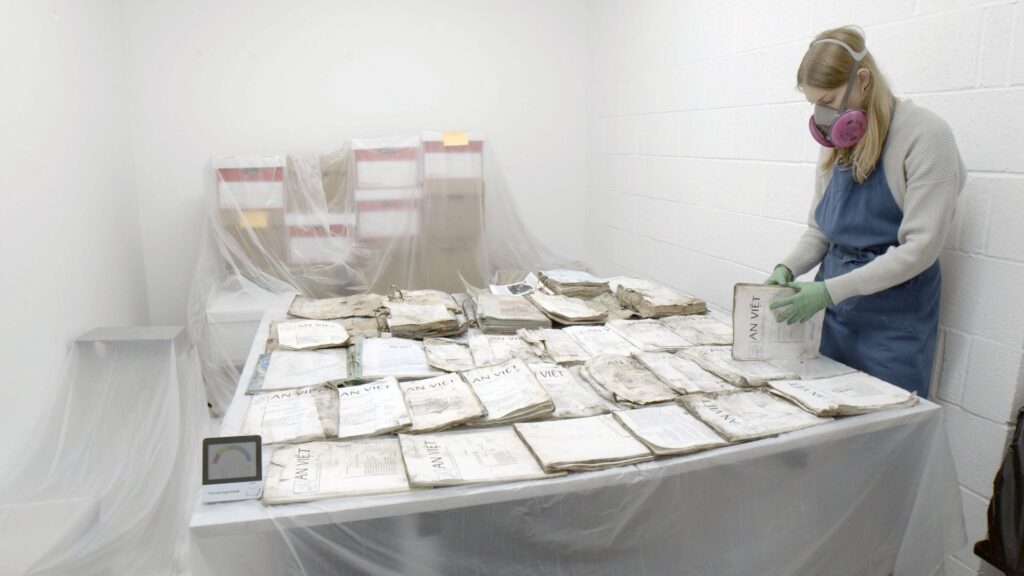Main section
Image credit (above): The University of Manchester
Click on the headings below to read this year’s case studies, based on the themes of Archives Unlocked.
Tabs Navigation
Tabs
Advocacy and Reputation
‘Not only did we make a new and valued partnership, but we brought diverse communities together through powerful storytelling that found resonance with our shared past’
Lin Rice
Librarian: Community History, Knowsley Archives Service
In 2017, a volunteer at Knowsley Archives discovered a collection of papers at a local car-boot sale. The records contained personal documentation about a Polish national and blacksmith, Stefan Skura, who migrated to England in 1947.
As part of the Knowsley Borough of Culture 2022 celebrations, the archive contacted Merseyside Polonia, a Polish not-for-profit organisation, and embarked on a collaborative project to translate and exhibit the Skura collection. To contextualise his life within the wider context of Polish history and migration, the project developed two exhibitions tracking the life of both Skura and the composer and pianist, Frederic Chopin.
For Knowsley Archives, the project provided an excellent opportunity to make strong new links with an external organisation and share the diversity of their collections. Polish volunteers visited the archive and worked together on translating the Skura collection. Whilst the documents presented challenges, such as out-dated Polish terminology, the volunteers felt that they developed personally through the experience, improving both their confidence and language skills.
Polish archives within the UK are rare and the public can view archives as difficult spaces to navigate. For the volunteers, working with the Skura collection created a sense of belonging, seeing their language and stories advocated as local history within their archive service. Exhibiting the collection also helped to strengthen the emotional link between Knowsley Archives and the Polish community.
The exhibitions, ‘Famous & Unknown: Discover Polish Migration stories’, opened with a launch event on 21 June and ran until 7 July. Fifty people from the local community attended the event, which provided Polish food and a musical performance of Chopin. The exhibitions received local recognition, with an article published in the July edition of Knowsley’s local newspaper, The Challenge. Next year, the Stefan Skura Collection will travel to the Smithy Heritage Centre in Eccleston. The positive publicity and continued demand for the exhibitions is testament to the success of this collaborative project.
Digital
‘The project was very much an experiment – it’s been fun to disrupt assumptions about what archives are, and how they can be collected, both with the young people we’ve been working with and also within the council. The project has strengthened our relationships with stakeholders across the board.’
Hannah Stamp
Archivist and Project Lead, East Riding Archives
East Riding Archives’ Blockdown project harnessed the possibilities of the videogame Minecraft as an interactive learning environment and as a tool to collect young peoples’ experiences of the COVID-19 pandemic in the region.
The service was aware of the need to fill a gap in its wider contemporary collecting initiative during the pandemic, which lacked the voices of those aged 5-16. The Archivist gained funding from The Audience Agency to create an ‘Archiverse’ in Minecraft. Within the Archiverse, young people were able to explore a re-creation of East Riding Archives’ home, the Treasure House, leaving their contributions to the archive by writing in a virtual book or building a 3D visual representation of their experiences of the pandemic. The Archivist transferred the contributions from Minecraft into the service’s digital archive management system. Now, over 60 contributions from young people sit alongside the wider COVID-19 collection, which is accessible online.
The project hinged on co-ordination between the archive, the council’s Information Governance team, and its IT department to ensure compliance with data protection, licensing, and online safety needs. Protocols for handling emotionally sensitive contributions were also created. The Archivist ran a workshop at a primary school and drop-in sessions at libraries to help young people to navigate the Archiverse and to create their contributions collaboratively within the game. These sessions also encouraged the Archivist to try new methods of evaluation suitable for younger audiences, incorporating these into the game.
East Riding Archives will build on the success of Blockdown by exploring ways to use virtual reality to view the 3D models created by contributors within the game, and how these can be embedded into online exhibitions and social media. This will enable the archive to share these collected experiences with wider audiences and further the service’s digital innovation.
Diversity and Inclusion
‘The silence is deafening.’
Désirée Reynolds
Writer in Residence, Sheffield Archives
In 2021, Désirée Reynolds (writer), Cheryl Bailey (archivist) and Otis Mensah (poet, hip-hop artist) embarked on a journey to excavate stories of Sheffield’s Black and marginalised voices in the archives. The project was led by Désirée, who became the Writer in Residence at Sheffield Archives. The archival record was combined with prose and fiction to produce a creative response to what was found and what was absent in the archives.
They sought to find the individuals who had long been there. However, as Désirée found: ‘we are on posters, play bills, “roll up” – blackness as spectacle only… and at the same time, we are nowhere.’ Most stories were only captured in fragments and often at a point of trauma such as in court records or newspaper reports. The aim was to ‘lean into’ these stories in a sensitive way, to take these individuals out of the archive and into people’s imaginations.
A diary of slave-trader Thomas Staniforth opened up conversations about archival silences. Cheryl describes the diary as absent of information: a mundane account of his visit to Sheffield to check on colliery investments, go out to dinner, visit his son. For Désirée, the record was deeply affecting: ‘so casual, nothing to see here and yet this man caused the suffering and death of thousands upon thousands and that legacy must run into millions – the silence is deafening.’
This work has led the archivists at Sheffield Archives to re-evaluate their archival practice. Cheryl and Désirée are continuing to work together to ensure protocols are in place to deal with racist language in the archives and catalogue descriptions. As Désirée points out, if the language is not right at the point of entry, people may walk away.
The outcomes of the project were numerous: three exhibitions, panel discussions, a fanzine, creative writing, poetry performances and other collaborations with artists of colour. The project’s legacy is the continued work to use the archival record as the root that gives a voice to those that have been omitted – as Désirée stated, ‘we must see archives as a source of reparative justice, we were always here.’
Enrichment
‘The remarkable story at the heart of this heritage project has inspired some amazing creativity and performances by young people in West Suffolk, working together with world-class artistic leaders and orchestral musicians.’
Stuart Bruce
Senior Creative Producer at Orchestras Live
‘We have to move on’ is a partnership project between Suffolk Archives, the National Horseracing Museum (NHRM) and Orchestras Live. The project is based on the memoir of Fritz Ball, a Jewish refugee living with his wife Eva at a refugee hostel at Palace House Stables in Newmarket from 1939 to 1942. A copy of the memoir was deposited with the archive in August 2020 and was originally written in German but later translated into English by Fritz’s granddaughter. The account is of particular importance as very little is known about the refugee hostel, with no records having survived from the organising committee.
Palace House Stables is now home to the NHRM, who joined the project in its infancy. The museum had little information about the hostel and wanted to learn more about the building’s history and the stories it contained. One starting point was to identify other people that lived with Fritz and Eva; using the 1939 Register, the project team were able to identify another 23 people listed as living there. Working with volunteers and the Suffolk Liberal Jewish Community, the partners painted a picture of life at Palace House, which formed the basis of an exhibition at NHRM and played an integral role in developing new school learning resources.
Fritz Ball’s passion for music and his cello were a key theme running through the memoir and the team felt it was important to reflect this in their output. Orchestras Live came on board to produce two filmed concerts inspired by the refugees’ stories. Working alongside a composer, choreographer and professional orchestra Britten Sinfonia, local young people created and performed a new piece of music inspired by Fritz’s account of life at Palace House Stables.
Health and Wellbeing
‘The collections have illuminated the lives of those affected by HIV/AIDS and the care and compassion shown by carers, partners, relatives and friends. This project showcases the power of archives to highlight their experiences and to share other voices which are so often marginalised in society.’
Emma Markiewicz
Director of London Metropolitan Archives
London Metropolitan Archives (LMA) has been awarded a grant by the Wellcome Trust to catalogue and provide access to records that document the 1980s HIV/AIDS epidemic and its aftermath.
LMA has catalogued archive collections provided by three different charities. Mildmay Hospital, Europe’s first hospital to provide care for people dying from AIDS-related illnesses, deposited corporate records and case files of deceased patients. Positively UK, which provides peer-led support to people living with HIV, donated their annual reports, accounts, newsletters and other publications. Lastly, the National HIV Story Trust (NHST) provided 103 filmed oral-history interviews with AIDS patients, their carers, families and friends.
The collections contain a variety of records that document medical treatment, care and support, and the lived experiences of people affected by the epidemic. Providing access to these records through an online catalogue, research database and on-site media suite will shape both the public and researchers’ understanding of the AIDS epidemic and highlight the personal long-term impact that it has had on people’s lives. Given the delicate nature of this project, LMA has undertaken an ethical review in line with the Data Protection Act to ensure that sensitive material is flagged and, if necessary, redacted.
The project has led to numerous outreach events including conferences, professional skill-sharing events, film screenings, and a guided research project. In June, LMA welcomed students from the University of South Carolina to view the collections and, in July, the first set of NHST interviews previewed at the Science Museum to mark 50 years of Pride. A number of partnerships have also developed, such as with The Royal Central School of Speech and Drama who are working with LMA and Positively UK to use the archive material to develop new writing and a performance piece focused on women living with HIV.
To mark the end of the project, LMA will hold a conference on 10 March 2023. Academics, archivists and representatives from the three charities will discuss all the collections and explore the challenges faced whilst cataloguing the records.
Impact
‘The creation of the British Pop Archive enables us to change perceptions of the collections we hold here at the University of Manchester.’
Mat Bancroft, Curator
British Pop Archive
The British Pop Archive (BPA) was launched in April 2022 at the John Rylands Research Institute and Library, University of Manchester. It is the first national collection dedicated to the preservation and research of popular culture.
Establishing the collection in Manchester was recognised as being beneficial during early negotiations as it meant that key material could remain in the city where it was created, and the input of local music writer Jon Savage was instrumental in forging links with some of the individuals and families who deposited the first collections. Collections include those of Joy Division lead singer Ian Curtis, and the band’s manager Rob Gretton, photographer Kevin Cummins and the corporate archive of Granada Television. Despite these collections being predominately Manchester-centric, the BPA’s remit is nationwide and the launch has generated huge interest from a wide range of individuals and organisations across the country. Within five years, the BPA intends to establish itself as a key resource for pop, youth and counter-culture collections.
The creation of the BPA at the John Rylands Research Institute and Library presents the opportunity to engage new audiences with the collections. Material from the BPA could be used on degree courses by departments as diverse as Art History, Music, and Sociology, who may not previously have used material from Special Collections for teaching and research. Collections in the BPA also provide the chance to attract new external audiences, such as local residents who might previously have assumed that collections at the library were restricted to members of the university, or that there wasn’t material there that was relevant to them. The BPA enables audiences to preserve, explore and celebrate the 20th– and 21st-century culture, venues and experiences that are important to them.
Innovation and Risk
‘The escape room has helped to dispel some of the expectations of what a cathedral can or should do’.
Elizabeth Semper O’Keefe
Cathedral Archivist, Hereford Cathedral
Hereford Cathedral has used a story from their archive collections as the inspiration for an escape room. Whilst other cathedrals have hosted escape rooms on their premises, this is the first time that the escape room story has been developed from institutional archives.
The escape room was one strand of a larger National Lottery Heritage Fund project to repair and regenerate part of the cathedral estate known as the Eastern Cloisters. These were originally built to house the Vicars Choral, a group of deputies employed to sing in cathedral services.
A team of research volunteers and a coordinator spent six months researching various aspects of the cloisters’ history, developing content to support the wider Eastern Cloisters project and underpin outreach and engagement activities with records from the archives. One of the stories identified from archive collections was that of a nineteenth-century Vicar Choral accused of embezzlement, and it is this moment from history that forms the basis of the escape room story.
Participants are led into the escape room by a costumed ‘guard’, told that they have been charged with embezzlement, and given an hour to solve clues and prove their innocence. The cloisters are not usually open to the public, which enhances the concept that participants are visiting a hidden part of the cathedral. At the end of the hour, they have the opportunity to be photographed with a mocked-up newspaper declaring their guilt or innocence, depending on whether they solved the clues or not.
The escape room opened this Easter and has been a huge success, with every session being fully booked so far. It has provided a steady income stream and has attracted audiences that would not typically visit the cathedral including teenagers’ birthday parties, escape room enthusiasts, and even a hen party. Staff anticipate that they will probably need to develop a new story and clues in a couple of years’ time in order to maintain visitor interest, and will again use the archive collections as inspiration.
Resilience
‘We wanted to create a positive and supported experience for a trainee entering the archives sector. Their work identifying barriers to marginalised communities accessing our archive collections has been revealing. It is down to us to take this forward and develop tools to break down these barriers.’
Jim Ranahan
Former Archives West Midlands Trustee and No Barriers Project Lead.
The Archives West Midlands (AWM) partnership launched the No Barriers project in 2021 to help meet the need to diversify access to collections and provide a positive experience for a trainee to begin a career in the sector.
Funded by The National Archives’ Networks for Change scheme, the Archives and Records Association and AWM itself, the project offered a year-long paid traineeship to an individual from a marginalised community. The year was designed to give the trainee experience working at both the Shakespeare Birthplace Trust and Wolverhampton Archives and Local Studies, with mentorship throughout and carrying on as they continue their career. The trainee’s remit was to identify and report on barriers to accessing collections, enabling AWM to use these findings to develop solutions to ultimately remove these barriers.
The COVID-19 pandemic necessitated changes to the planned programme as the trainee was unable to work onsite for a significant amount of time. Additionally, there was a change in the trainee partway through the year as one trainee decided to return to academic studies.
Several learning points have emerged from AWM’s negotiation of these challenges, alongside the work of both trainees, which focused on barriers for LGBTQ+ and disabled communities. Building on existing resources and methodologies, these learnings will be developed into practical tools for the partnership and the wider archives sector. These include case studies on inclusive recruitment, selection, and retention of staff, on developing inclusive cataloguing practices, and on looking after the wellbeing of staff and users who may encounter offensive language in archival records. A rapid assessment model for inclusive practice within archive services is also being developed. The partnership continues to look at other barriers to access, and what can be done to address these by member services and the partnership collectively.
Openness
‘Putting collaborative working first has created strong relationships with global reach and local benefit.’
Etienne Joseph
(Acting) Heritage/Archives Manager, Hackney Archives
Hackney Archives worked in partnership with Hackney Chinese Community Services (HCCS) to rescue and stabilise the collection of the An Viet Foundation (AVF). The AVF was founded in 1982 by Vu Khanh Thanh, an early migrant to the UK, and it evolved to help Vietnamese migrants integrate into the local area and navigate living in a different country. It established a cultural resource centre in Hackney, providing communities access to thousands of books, theses and pamphlets relating to East and South East Asian culture.
The AVF was dissolved in 2017 and Hackney Chinese Community Services (HCCS) assumed responsibility for AVF’s assets, including the organisation’s archive and former resource centre. In 2019, it was discovered that squatters had occupied the building storing this collection, and the archive material had been disturbed, displaced and left exposed to rain and weather damage. In response to HCCS’s public call for help, Hackney Archives began work to help rescue the collection, but progress stalled due to the COVID-19 pandemic. In 2020, Hackney Archives, in partnership with HCCS, applied to The National Archives’ COVID-19 Fund for a grant to temporarily store, stabilise and conserve over 5000 documents, photographs and published material, prior to finding them a permanent home.
Alongside a year-long programme to conserve and scope the collection, work took place to consolidate a community steering committee that would lead decision-making about the future of the archive. A Vietnamese/English-speaking project officer was recruited to co-ordinate activities, and establish a consortium of partners to promote the long-term accessibility of the collection. To date, all project objectives have been achieved (except creating a website for the steering panel, which is nearly finished), and the steering committee will soon be announcing their decision about the permanent home for the archive. The project has underlined the importance of collaborative working practices with community partners, and of ensuring that community representatives are involved in all stages of the decision-making process.
Trust
‘Every workplace has a wealth of people and they each have a story to tell.’
Sara Kinsey
Head of Historical Archives, Nationwide Building Society
When Nationwide Building Society’s archives were set up in 2016, they presented a rich record of business activity that sadly fell short on human stories. There was little information in the archives about the people who worked there and how those people had changed over the years. However, Nationwide and Create Studios knew that ‘every workplace has a wealth of people and they each have a story to tell’. Funded by the National Lottery Heritage Fund, Create Studios and Nationwide worked together over 2 years to capture the variety of human experience across the building society to understand their employees’ journeys and what makes them who they are.
The ‘See Me Nationwide’ project recorded 20 interviews and created 3 films on the themes of Journeys, Belonging and Challenges, using clips from these interviews. Taking the stories as a starting point, the archive also developed school workshops in tandem with Swindon Schools of Sanctuary. The students considered not only the stories of Nationwide employees but also their own stories. The children filmed themselves and conversations opened up through creating an environment of trust.
A pop-up exhibition at Swindon shopping centre, supported by interviewees, demonstrates the pride in what has been created. One interviewee told the project team: ‘I’m grateful that you’ve given me an outlet for my voice’.
Nationwide has recognised the value of the participants’ honest recordings about their experience of working for the society and their own personal journeys. The films are now embedded into the society’s internal learning for staff development and recruitment. The project has brought about a positive change in the relationship between the archives and employees – there is now an appreciation that the archives are about them and for them.
